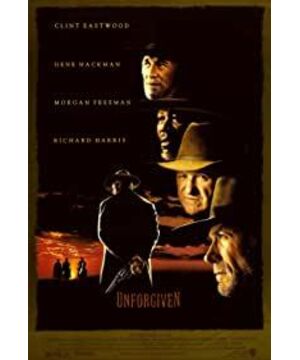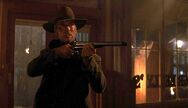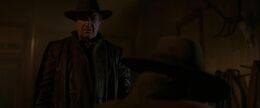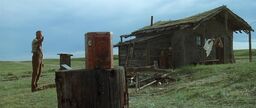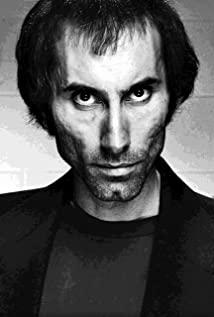Unlike the Westerns of the Golden Age, "Unforgivable", like the Italian Westerns, has a vague and ambiguous position. There is no strict sense of right and evil, black and white, and some are just stories from a group of people in the west. The protagonist of the film is a killer, so due to the relationship between the protagonist, the audience usually regards him as a "decent"; and the "villain" in the film is a sheriff. Although it represents legal justice, it is due to the relationship with the protagonist. They are opposite, so they become "villains" in the film.
This phenomenon is very interesting. In real life, there are no real good people and bad people. Everyone has many faces. But in the process of watching a movie, the audience will only follow the law of "dual opposition" and divide the characters into good and bad, black and white, right and evil. Of course, this is a simple thinking in the movie world, but Eastwood tries to use this kind of thinking and uses the influence of the movie perspective to reverse the black and white in the movie world. So when the audience cheered for the final protagonist to kill the "villain", the audience actually cheered "justice down". Isn't this the biggest irony of the black and white duality of the legislation in the movie world?
Of course, Hitchcock's "Telephone Murder" and Billy Wilder's "Double Compensation" both portrayed the "decency" of the bad guys in order to release the criminal impulse in the audience. On the basis of his predecessors, Eastwood further satirizes and resists tradition, which is naturally the best embodiment of the core values of Western films.
The image of the positive and the villain are closely related to the rhythm of the movie plot. I refocused on the movie plot and found that it was somewhat awkward in terms of advancement. The story originated from the fact that the prostitute was disfigured by two cowboys (the actual perpetrator was only one). Because the sheriff wanted to make the sentence (the death penalty) that the prostitute wanted, so he started to privately raise the killer. This is the first part of the plot. However, in the author's opinion, although the justice of the sheriff is suspected to be quiet, why are the prostitutes so extreme that they buy homicide? And the motivation is always unshakable. Because the film lacks a portrayal of the prostitute group, this makes the cause of the plot of the film unconvincing.
The second plot is a two-line narrative. On the one hand, it tells that the long-retired killer returns to the arena and recruits the team to start planning; on the other hand, it tells that other killers are severely punished by the sheriff. There is also an awkwardness in this part. Why did the killer who had retired for his wife suddenly decided to come back? According to him, it is economic reasons, so the protagonist always talks about the money-sharing plan. It is indeed a villain image, and the movie still lacks foreshadowing. On the contrary, the image of the sheriff is more vivid, but in order to return it. Into the "villain", the director associates it with "violent law enforcement".
Finally, there is the conflict between the pros and the villains. The protagonist still has no reasonable and convincing motives. It was not until Freeman was tortured that there was a reason for revenge, and the audience was completely on the side of the protagonist and hoped that the protagonist would be killed. The sheriff of the villain. The audience's transition is very interesting. Although the "violent law enforcement" of the sheriff is offensive, it still looks very positive compared to the protagonist's faction of buying homicide. But because the death of one of the protagonists aroused the emotional emotions of the audience, and completely abandoned the rational thinking of the previous one and a half hours, Eastwood is very skilled in controlling the audience's emotions.
I don’t know if the flaws in the first half of the plot are intentional, but what is certain is that the film objectively completes the provocation of the audience’s judgment: What is the lack of conviction in the plot and the characters? Simple emotional control is enough to master everything. Although the plot lacks achievements, the movie’s emotional control and guiding the audience’s position are worthy of discussion and thought-provoking.
View more about Unforgiven reviews


